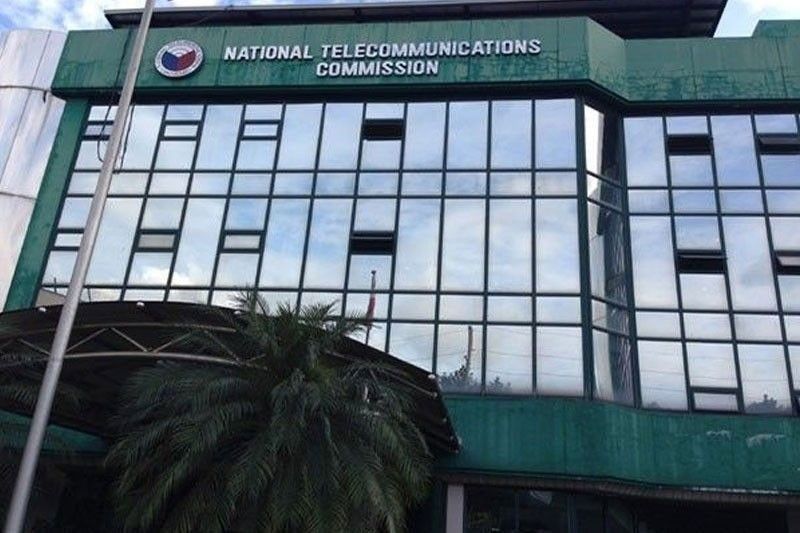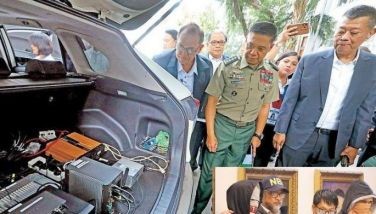NTC partners with Meta, Viber vs text scams

MANILA, Philippines — The National Telecommunications Commission (NTC) is coordinating with social networking and online messaging platforms such as Meta and Viber to discuss ways to prevent the proliferation of text scams.
In an interview aired on GTV’s “Balitanghali,” NTC Deputy Commissioner Jon Paulo Salvahan said agency officials have noted that scammers are now going to other platforms to carry on their illegal activities while continuing to find ways to register subscriber identity module or SIM cards using fake or spurious documents.
NTC officials had met with Meta and Viber officials before the raid of a Philippine offshore gaming operation hub in Porac, Pampanga, where SIM cards allegedly used for online fraud and scams were discovered, according to Salvahan.
“We had already met with representatives from Meta, which handles Facebook, Instagram and Messenger. We also met with Viber (officials). They met with us about a month or two months ago,” Salvahan disclosed.
Scammers will find ways to register or submit fake or fictitious registration documents, as well as transfer their activities to over-the-top platforms such as WhatsApp, Telegram and Viber, which are currently not covered by the SIM Registration Act, according to the NTC official.
It was also found that scammers could have obtained personal information from users who have registered their names and phone numbers in some stores or establishments.
Considered during the meeting was the sharing of deactivated SIM numbers by telecommunications companies to the over-the-top platforms for the respective deactivation in their applications.
“We are already discussing possible measures to address the scamming and spamming used on their platforms, including possible data sharing. The telcos will share data of their deactivated SIM numbers for over-the-top operators to deactivate them on their platforms,” Salvahan said.
He added that the NTC is looking into calls made to tighten the implementation of the SIM card registration law and that they would cooperate with the Senate to enhance the law, as well as the commission’s regulations.
Maxicare
Meanwhile, the Department of Information and Communications Technology (DICT) is ready to provide technical assistance to leading health maintenance organization provider Maxicare, which confirmed last Tuesday to have suffered a data breach.
DICT Undersecretary for infostructure management, cybersecurity and upskilling Jeffrey Ian Dy said the agency’s National Computer Emergency Response Team had already conducted an initial probe on the incident.
Initial investigation showed the data leak started when the threat actor discovered login and password credentials on the internet.
“The threat actor then logged into the system and downloaded available data. We are coordinating with the NPC and will communicate with Maxicare to offer our assistance if they need it,” Dy said, referring to the National Privacy Commission.
“The NPC received a data breach notification report from Maxicare Healthcare Corp. through the NPC’s Data Breach Notification Management System on June 16, 2024 at 12:09 p.m.,” NPC Public Affairs and Information Division chief Roren Marie Chin told media last Tuesday.
Dy said the Maxicare breach raised the need for all organizations to implement either password-less authentication mechanisms such as biometric authentication, or to use multi factor authentication to prevent these incidents from happening again.
“Also, all organizations, public and private, must exercise reasonable control over their outsourcing partner and ensure that they also implement robust cybersecurity measures,” he added.
News source
Online and social media remain the most popular sources of news in the Philippines, with more Filipinos – like the rest of the world – shifting from text to video content, such as those uploaded on popular short-form video sharing platform TikTok.
The 2024 Digital News Report (DNR) released by the United Kingdom-based Reuters Institute for the Study of Journalism found that online, including social media, is the source of news of 82 percent of Filipinos included in the survey.
Some 63 percent said they get their news from social media, while 46 percent said they get it from television.
Interestingly, all figures went down from last year’s report, which indicated that 86 percent of Filipinos get their news online, 70 percent from social media and 52 percent from television.
News consumption from print sources remained largely the same, from 14 percent last year to 13 percent this year.
At 61 percent, Facebook remains the most popular source of news among Filipinos, although it went down 11 points from 72 percent last year.
It was followed by YouTube at 45 percent (from 55 percent), Facebook Messenger at 26 percent (from 33 percent), TikTok at 23 percent (from 22 percent), Instagram at 12 percent (from 14 percent) and X (formerly Twitter) at nine percent (from 16 percent).
Overall trust in news in the Philippines is stable at 37 percent, the same as in 2022 and almost similar to 38 percent last year.– Janvic Mateo
- Latest
- Trending



























